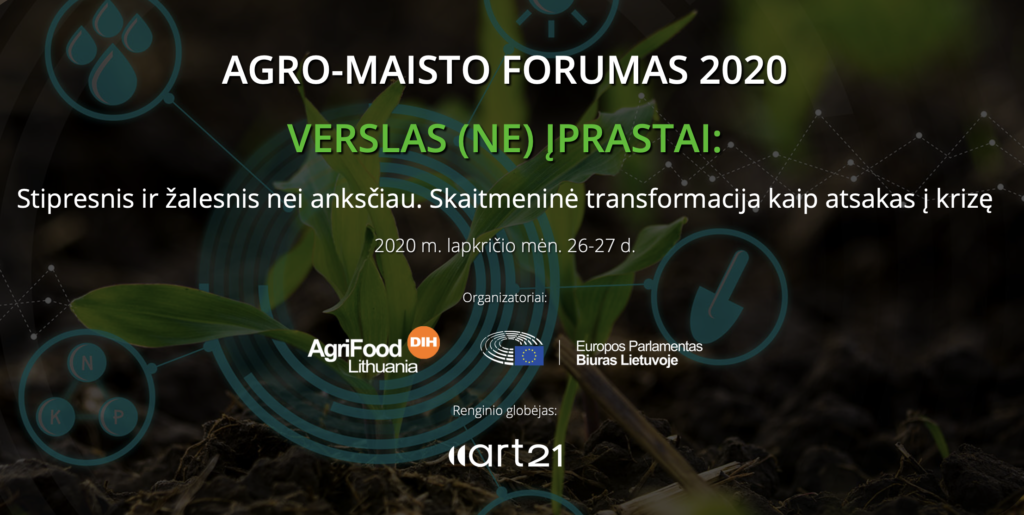Agriculture is approaching a tipping point: the European Green Deal, the reform of the Common Agricultural Policy, the ongoing digitalization process and the world’s response to the COVID-19 pandemic crisis will fundamentally change the perception of productivity, sustainability and technology in agriculture. – food industry. The main trends of the industry will be discussed in detail at the International Agri-Food Forum 2020, which will be held remotely on November 26-27. The event is aimed at businesses, decision makers, farmers and anyone interested in the prospects in this area. Participation in the forum is free, but due to the limited number of people who can join, pre-registration is required.
The organizers of the event – AgriFood Lithuania DIH and the Liaison Office of the European Parliament (EP) in Lithuania – emphasize that the decisions taken today will determine the long-term future of the agricultural and food industry. “At the end of October, the European Parliament voted to make EU agricultural policies more flexible, resilient and resilient to crises. MEPs will strive to ensure that a significant portion of their support goes to tackling climate change and ensuring biodiversity. In the past, the European Parliament has advocated solutions that reduce the use of fertilizers and antibiotics in food production and shorten the food supply chain. In the near future, funds from the Economic Recovery Fund should go to Europe.
According to Kristina Shermukshnite-Alesiunienė, Managing Director of AgriFood Lithuania DIH, the pandemic has brought many changes and Europe needs to respond urgently. The digital transformation proposed by the European Commission is a key response to the crisis that will make countries and businesses resolute enough to seize this opportunity more resilient and stronger than ever before.
Forum speakers – leaders from all over Europe
Today the AgriFood Forum 2020 topic is more relevant than ever. An excellent proof of this is the list of speakers, which includes leading European and Lithuanian experts, politicians, entrepreneurs and decision-makers from the European Commission. It includes members of the European Parliament Juozas Olekas, Bronis Rope and Petros Kokkalis, President of the Lithuanian Confederation of Industrialists Vidmantas Janulevičius, Director of the EIT Food Consortium Marya-Liisa Meriche, President of the Alliance of European Clusters Antonio Novo Guerrero, Managing Partner of the Iron Wolf Capital Venture Capital Fund, Casparas CEOs of Agrokoncernas, Dojus Agro, Scandagra Baltic and many others. The full list of speakers is available on the official forum website.
According to Grigoris Hatzikostas, one of the AgriFood Forum 2020 moderators and co-pioneer of digital innovation centers in Europe, COVID-19 has tested the resilience of our food systems, but has also accelerated the adoption of game-changing technologies. Mr. Hatzikostas believes that this forum is a meeting place where various stakeholders in food ecosystems – farmers, technology developers, entrepreneurs, food chain providers, decision makers and consumers – can come to an agreement, make decisions and take action to transform agri-food sector and creating a greener, sustainable and prosperous future.
Focus on Europe and Lithuania
AgriFood Forum 2020 will take place on November 26-27. The first day of the event will focus on EU solutions and strategies, while the second day will focus on the future of the Lithuanian agri-food industry. The number of people who can join is limited, so those who wish are encouraged to register in advance.
This forum is a continuation of the International Agribusiness Forum, which took place at the Vilnius City Hall in 2019, during which a memorandum was signed. The purpose of the Memorandum was to promote further cooperation between various participants in the agri-food ecosystem, to create an infrastructure that supports the development of digital innovation in Lithuania and to provide the necessary funding. All these goals have been successfully achieved.

